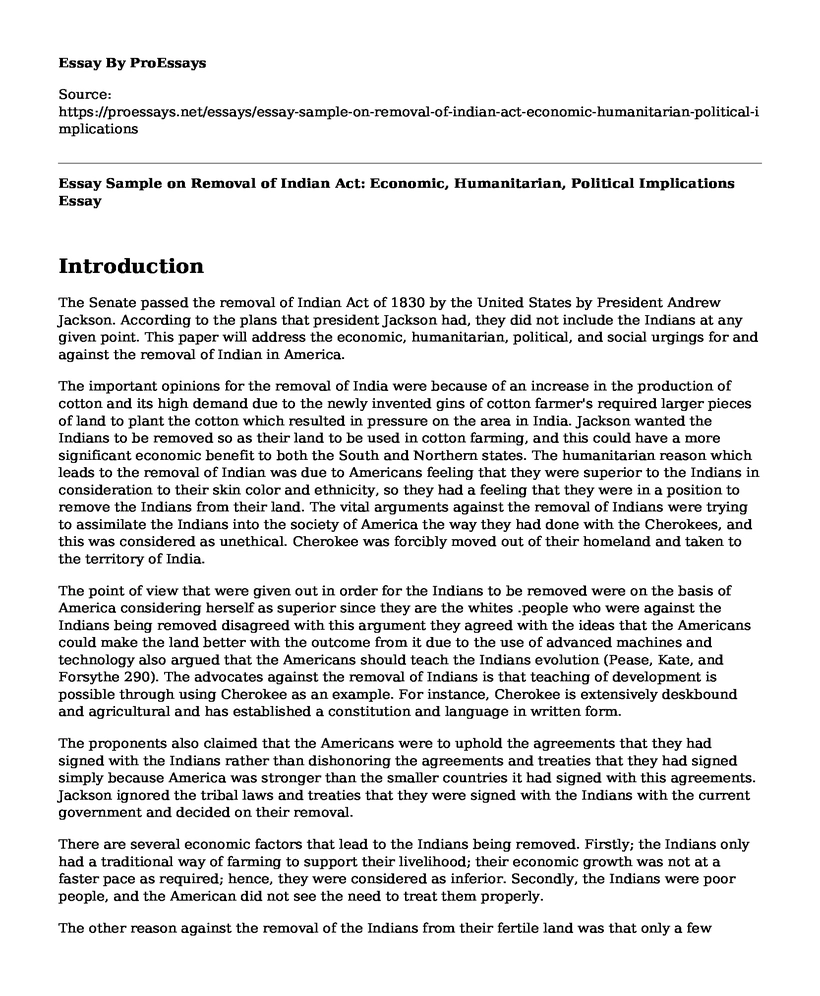Introduction
The Senate passed the removal of Indian Act of 1830 by the United States by President Andrew Jackson. According to the plans that president Jackson had, they did not include the Indians at any given point. This paper will address the economic, humanitarian, political, and social urgings for and against the removal of Indian in America.
The important opinions for the removal of India were because of an increase in the production of cotton and its high demand due to the newly invented gins of cotton farmer's required larger pieces of land to plant the cotton which resulted in pressure on the area in India. Jackson wanted the Indians to be removed so as their land to be used in cotton farming, and this could have a more significant economic benefit to both the South and Northern states. The humanitarian reason which leads to the removal of Indian was due to Americans feeling that they were superior to the Indians in consideration to their skin color and ethnicity, so they had a feeling that they were in a position to remove the Indians from their land. The vital arguments against the removal of Indians were trying to assimilate the Indians into the society of America the way they had done with the Cherokees, and this was considered as unethical. Cherokee was forcibly moved out of their homeland and taken to the territory of India.
The point of view that were given out in order for the Indians to be removed were on the basis of America considering herself as superior since they are the whites .people who were against the Indians being removed disagreed with this argument they agreed with the ideas that the Americans could make the land better with the outcome from it due to the use of advanced machines and technology also argued that the Americans should teach the Indians evolution (Pease, Kate, and Forsythe 290). The advocates against the removal of Indians is that teaching of development is possible through using Cherokee as an example. For instance, Cherokee is extensively deskbound and agricultural and has established a constitution and language in written form.
The proponents also claimed that the Americans were to uphold the agreements that they had signed with the Indians rather than dishonoring the agreements and treaties that they had signed simply because America was stronger than the smaller countries it had signed with this agreements. Jackson ignored the tribal laws and treaties that they were signed with the Indians with the current government and decided on their removal.
There are several economic factors that lead to the Indians being removed. Firstly; the Indians only had a traditional way of farming to support their livelihood; their economic growth was not at a faster pace as required; hence, they were considered as inferior. Secondly, the Indians were poor people, and the American did not see the need to treat them properly.
The other reason against the removal of the Indians from their fertile land was that only a few Indians had signed that they want to leave their land majority of them had not accepted to sign to leave their property. Cherokee and other tribes were in the process of being assimilated that is they were converting to Christianity, put on American dresses, and had well-cultivated grounds, and some of them owned slaves.
Works Cited
Pease, Kelly-Kate, and David P. Forsythe. "Human rights, humanitarian intervention, and world politics." Hum. Rts. Q. 15 (1993): 290.
Cite this page
Essay Sample on Removal of Indian Act: Economic, Humanitarian, Political Implications. (2023, Jan 12). Retrieved from https://proessays.net/essays/essay-sample-on-removal-of-indian-act-economic-humanitarian-political-implications
If you are the original author of this essay and no longer wish to have it published on the ProEssays website, please click below to request its removal:
- The Case on Rosenbergs Essay Example
- Essay Example on the US Political Parties: Their Role in Elections
- Essay Example on Nurturing Young Minds: Unlocking Brilliance in Kids Ages 2-8
- Essay Example on Europe's Past: Revolutions Shaping the Present
- God's Unconditional Love: Marriage & Homosexuality in Christian Perspective - Essay Sample
- Free Essay Example: How Corruption Has Derailed Growth in Africa
- Social Inequality - Essay Sample







